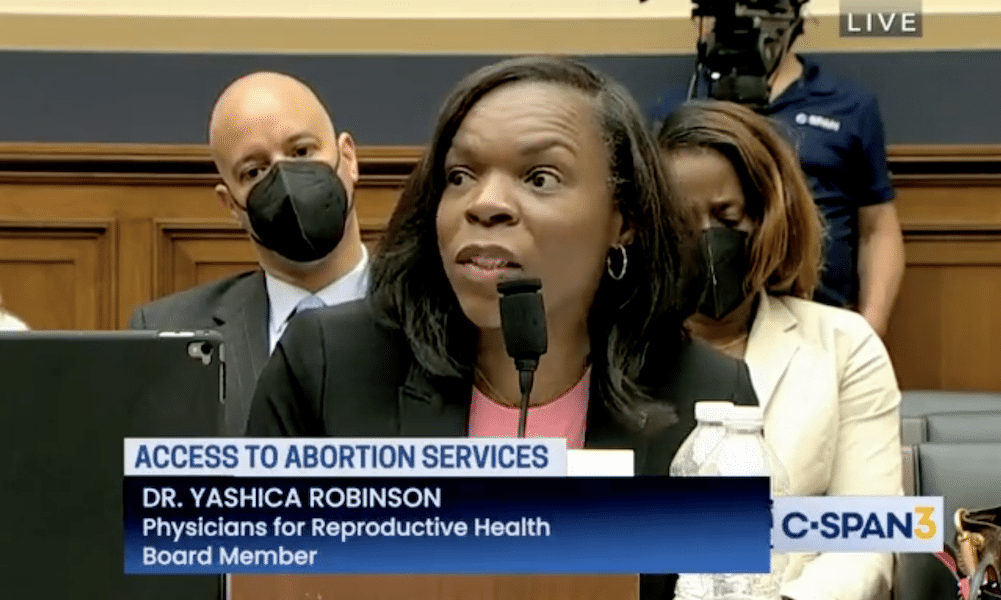Dr Yashica Robinson expertly shut down Republican representative Dan Bishop’s irrelevant question. (C-SPAN)
A Republican congressman asked the tired and loaded question “what is a woman” at a hearing on abortion access, and it backfired beautifully.
A House Judiciary Committee hearing on abortion rights was held on Wednesday (18 May) in light of this month’s Supreme Court leak, which revealed a draft opinion that would overturn the 1973 decision Roe v Wade, which ruled that abortion access was a constitutional right.
The leak was labelled as a first draft majority opinion, and the court’s final decision will not be known until later this summer.
The hearing, “Revoking Your Rights: The Ongoing Crisis in Abortion Care Access”, explored the implications of overturning Roe v Wade, and a panel of expert witnesses included Dr Yashica Robinson, a board-certified OBGYN and board member with Physicians for Reproductive Health.
During the hearing, Robinson described the difficulties already faced by pregnant people across the US caused by restrictions on abortion access, and added: “It is undeniable that without access to abortion, maternal mortality rates will continue to rise. I cannot emphasise enough that abortion is essential health care.”
Despite Robinson being the only medical professional on the panel, and hearing having limited time to learn from her expertise on abortion access, North Carolina Republican representative Dan Bishop asked the doctor to define the word “woman”.
Womanhood has no concrete and universally agreed upon definition in either law or medicine, and women’s experiences of their gender are vastly diverse and complex. Further, not all people who seek abortions are women, and so the loaded question was irrelevant to the hearing.
Nevertheless, Bishop asked: “In your written testimony, I noticed you said that you use she/her pronouns. You’re a medical doctor. What’s a woman?”
Robinson began to tell Bishop that it was ““important for you to understand why I said I use she/her pronouns”, but Bishop interrupted her, asking again: “What is a woman?”
“I think it’s important that we educate people like you about why we’re doing the things that we do,” said Robinson.
“So the reason I use she and her pronouns is because I understand that there are people who become pregnant that may not identify that way and I think it is discriminatory to speak to people or to call them in such a way as they desire not to be called.
“It’s important that we respect each individual person.”
Bishop would not be deterred and ploughed on: “Can you answer my question of what’s a woman?”
“I’m a woman,” said Robinson.
He asked: “Is that as comprehensive of a definition as you can give me?”
Expertly shutting him down, the OBGYN said: “That’s as comprehensive of a definition as I will give you today because I think that it’s important that we focus on what we’re here for, and it’s to talk about access to abortion.”
Rep. Dan Bishop to Dr. Yashica Robinson: “You’re a medical doctor. What’s a woman?”
“I’m a woman,” she replies. pic.twitter.com/KEH4ngYijk
— Aaron Rupar (@atrupar) May 18, 2022
The emotional abortion hearing saw one congresswoman recall her miscarriages and stillbirths: ‘After which failed pregnancy should I have been imprisoned?’
The emotional House Judiciary Committee hammered home the terrifying ramifications of overturning Roe v Wade and allowing states to criminalise abortion.
Georgia Democratic representative Lucy McBath told the hearing about her traumatic relationship with pregnancy, and recalled her miscarriages and still birth.
“After which failed pregnancy should I have been imprisoned?” McBath asked the hearing.
“Would it have been after the first miscarriage? After doctors used what would be an illegal drug to abort the lost fetus?”
“Would you have put me in jail after the second miscarriage? Perhaps that would have been the time, forced to reflect in confinement at the guilt I felt, the guilt that so many women feel after losing their pregnancies?”
“Or, would you have put me behind bars after my stillbirth?” she continued. “After I was forced to carry a dead fetus for weeks, after asking God if I was ever gonna be able to raise a child.”
House Judiciary Committee’s Democratic chairman Jerrold Nadler told the hearing: “Overturning Roe would remove from individuals the power to decide the fundamental question of whether to carry or terminate a pregnancy and, instead, would give that power to the State… Before continuing, I want to say something to all those who are currently considering abortion care.
“Despite these very real concerns about the state of access to abortion care or its continuing legality, let me be clear: abortion remains legal, and your right to get an abortion continues to be constitutionally protected, at least for now.
“Making decisions about when and how to start a family is central to women’s lives. The right to decide whether to carry or terminate a pregnancy is central to life, liberty, and equality.
“It is the very essence of what it means to have bodily autotomy, which is a prerequisite for freedom. Again, to say it simply, the decision to become a parent belongs to that individual.”
